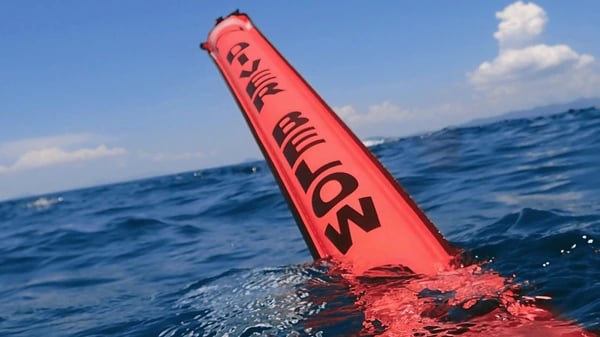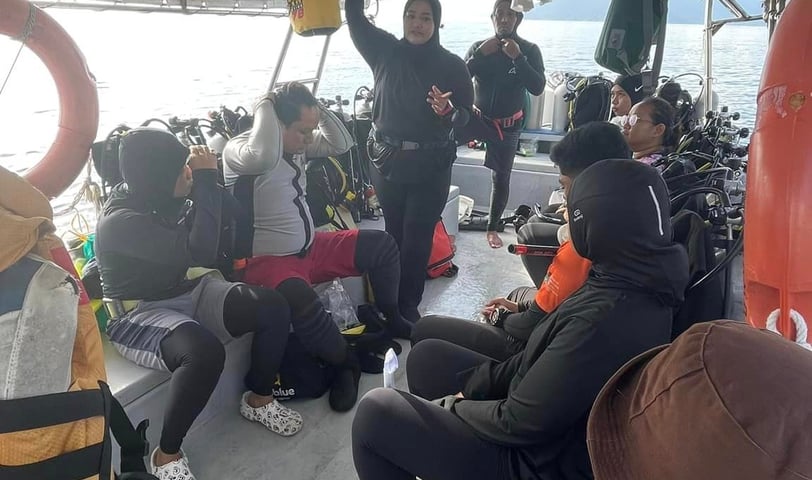Dive Safe: Your Comprehensive Guide to Scuba Diving Safety
Ready to explore the underwater world? This guide covers essential safety tips for a fun and worry-free dive. From checking your gear and diving with a buddy to respecting marine life and planning your dive, we've got you covered. Dive smart and stay safe with these easy-to-follow tips!
DIVE TIPS
Author: DiverGen
8/13/20245 min read


Scuba diving offers a unique chance to explore the mesmerizing underwater world, but safety must always come first. Diving into the deep blue can be an incredible adventure, but it also comes with its own set of risks. Whether you’re a novice taking your first plunge or a seasoned diver refining your skills, understanding and practicing scuba diving safety is crucial. This guide will walk you through essential safety tips, from proper training to equipment checks, to ensure your dives are as enjoyable and safe as possible.
1. Get Proper Training and Certification
Before you even think about hitting the water, it’s vital to get proper training and certification. Enrolling in a reputable scuba diving course is the first step. These courses, typically offered by recognized organizations like PADI (Professional Association of Diving Instructors) or NAUI (National Association of Underwater Instructors), will teach you the foundational skills needed for safe diving.
During your training, you’ll learn how to use your diving equipment, understand underwater physics and physiology, and handle various underwater situations. Certification is more than just a piece of paper—it’s proof that you’ve gained the skills necessary to dive safely and confidently. Whether you’re just starting or looking to advance your skills, ongoing education and training are essential for maintaining safety and competence underwater.
2. Dive with a Buddy
The buddy system is a fundamental safety principle in scuba diving. Diving with a partner adds an extra layer of security and ensures that you’re not alone in case something goes wrong. Before the dive, discuss and agree on a plan with your buddy. This plan should cover your dive site, depth, time, and any specific objectives for the dive.
While underwater, stay within sight of your buddy and use hand signals to communicate. Regularly check in with each other and ensure you’re both comfortable and following the dive plan. If an emergency arises, having a buddy means you have someone to help you manage the situation, making it a critical aspect of safe diving practices.
3. Check Your Equipment Thoroughly
Your scuba gear is your lifeline underwater, so proper maintenance and inspection are crucial. Before every dive, conduct a thorough equipment check. Ensure your tank is full, your regulator is functioning properly, and your buoyancy control device (BCD) is in good working order.
Check for any signs of wear or damage, such as cracks in the mask or tears in the wetsuit. Verify that all connections and straps are secure. It’s also a good practice to do a buddy check, where both you and your partner inspect each other’s gear to ensure everything is functioning correctly. Properly maintained equipment not only enhances your safety but also contributes to a more enjoyable dive.
4. Monitor Your Air Supply
One of the most critical aspects of diving is managing your air supply. Always keep a close eye on your air gauge throughout your dive. Plan your dive so that you use no more than one-third of your tank’s air for your descent and bottom time, leaving the remaining two-thirds for your ascent and safety stop.
If you find yourself running low on air, it’s important to ascend calmly and slowly. Rushing can lead to panic and disorientation. By following the rule of thirds and staying aware of your air supply, you’ll ensure a safe and controlled ascent, avoiding any potential emergencies related to air shortage.
5. Ascend Slowly and Safely
Ascending too quickly can result in decompression sickness, a serious condition caused by nitrogen bubbles forming in your tissues. To prevent this, always ascend slowly—no faster than 30 feet (9 meters) per minute. During your ascent, make sure to perform a safety stop at 15 feet (5 meters) for 3-5 minutes. This allows your body to off-gas any excess nitrogen gradually and reduces the risk of decompression sickness.
It’s also a good practice to plan your ascent based on your dive profile. Avoid rapid ascents or prolonged safety stops that could compromise your dive safety. Adhering to these guidelines ensures a safe return to the surface and helps prevent any post-dive complications.
6. Equalize Early and Often
As you descend, the pressure increases, which can cause discomfort in your ears and sinuses. To alleviate this, you need to equalize the pressure regularly. This is done by gently blowing while pinching your nose and keeping your mouth closed. Start equalizing early and do it frequently as you descend.
If you experience pain or difficulty equalizing, ascend slightly and try again. It’s important not to force the equalization, as doing so could cause injury. By staying aware of the pressure changes and equalizing often, you’ll ensure a more comfortable and safe dive.
7. Know Your Limits
Understanding and respecting your limits is crucial for safe diving. Avoid pushing yourself beyond your comfort zone or diving beyond your certification level. If you’re new to diving, stick to shallower depths and shorter dive times until you gain more experience and confidence.
Listen to your body and pay attention to any signs of discomfort or fatigue. If you feel unwell or unsure about any aspect of the dive, it’s perfectly okay to cancel or cut short the dive. Prioritizing your safety and well-being is essential for a positive diving experience.
8. Respect Marine Life
While encountering marine life is one of the highlights of scuba diving, it’s important to respect their space. Avoid touching, chasing, or feeding marine creatures. Not only does this protect the animals, but it also ensures your safety. Some marine life can be dangerous if provoked, and respecting their habitat helps maintain the natural balance of the ecosystem.
Remember that you are a visitor in their world. Observe and appreciate marine life from a distance, and follow any local guidelines or regulations regarding wildlife interactions. By being respectful and mindful, you contribute to the preservation of marine environments and enhance your own diving experience.
9. Stay Fit and Healthy
Scuba diving can be physically demanding, so maintaining a good level of fitness is important. Regular exercise and a healthy diet will improve your stamina and overall diving performance. Avoid diving if you’re feeling unwell, tired, or under the influence of alcohol or certain medications.
Good health not only makes diving easier but also ensures that you can handle any physical challenges that may arise underwater. By staying fit and taking care of your body, you’ll be better prepared for the physical demands of diving and can enjoy your underwater adventures to the fullest.
10. Plan Your Dive and Dive Your Plan
Proper planning is key to a successful and safe dive. Before you enter the water, develop a clear dive plan with your buddy. This plan should include details such as the dive site, maximum depth, dive time, and any specific objectives or routes.
Stick to the plan during your dive and make any necessary adjustments as conditions change. Following a well-thought-out plan helps ensure that both you and your buddy are on the same page and can respond effectively to any unexpected situations. Planning and sticking to your plan promotes a safer and more enjoyable diving experience.
Conclusion
Scuba diving opens up a world of wonder and adventure, but safety should always be your top priority. By following these essential safety tips, you can ensure that your dives are not only thrilling but also safe. From getting proper training to respecting marine life, each step you take towards safe diving enhances your overall experience.
Ready to explore the depths? Join us at DiverGen for unforgettable underwater adventures and expert guidance. Whether you’re just starting out or looking to enhance your diving skills, our team is here to support you every step of the way. Dive in with us and discover the ocean’s wonders safely and confidently. Happy diving!


Explore
Premier provider of scuba diving experiences and professional courses.
Passion
Ocean
diverlogyventures@gmail.com
+6012-2234432
© 2024 Diverlogy ventures (NS0302402-A) . All rights reserved.

